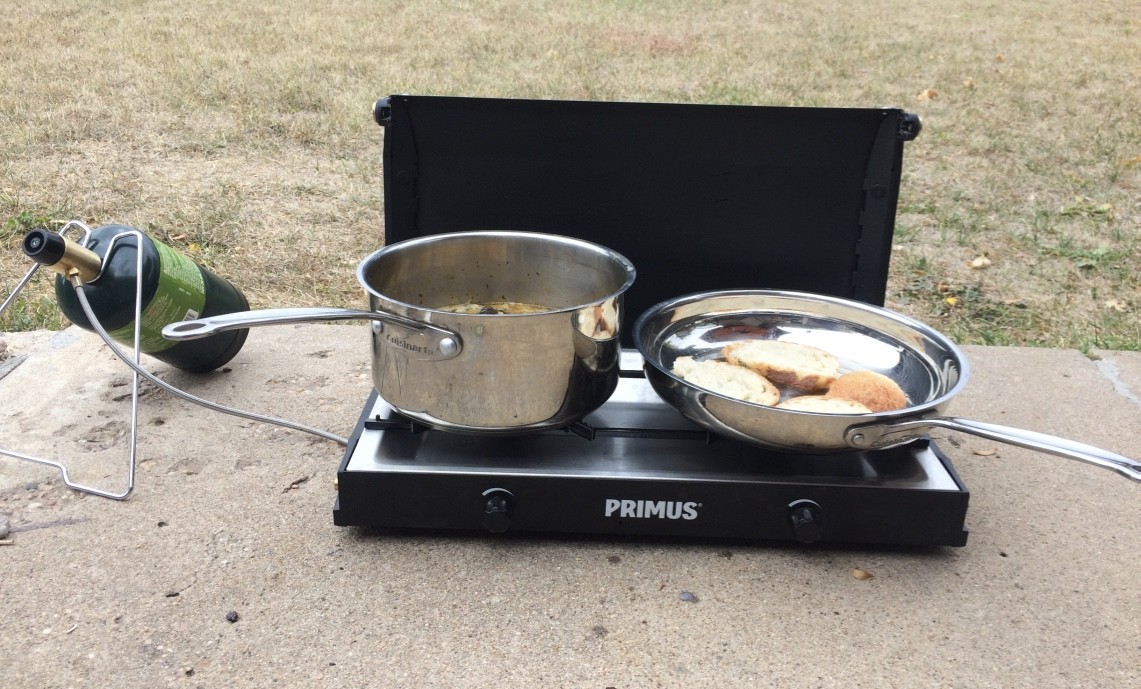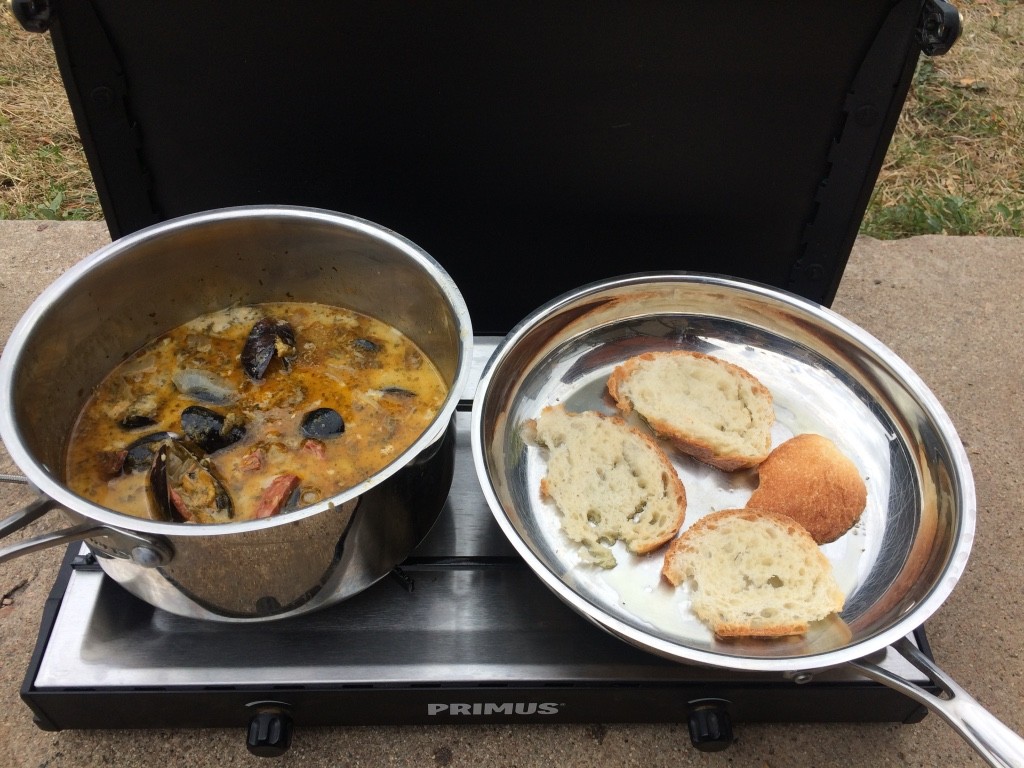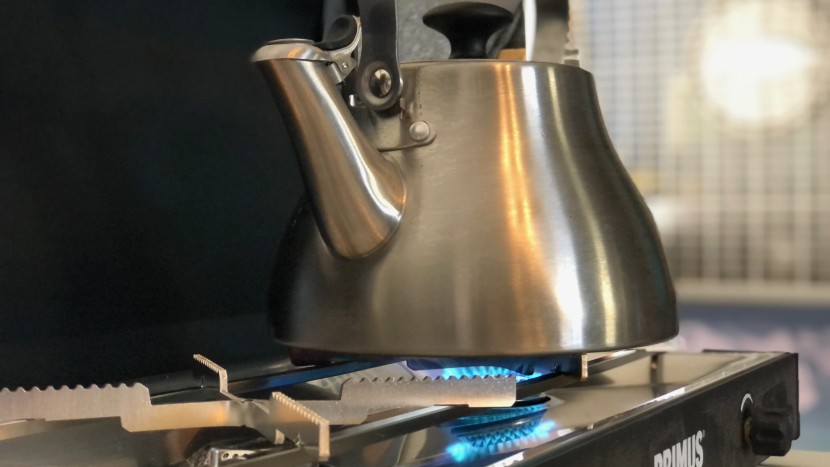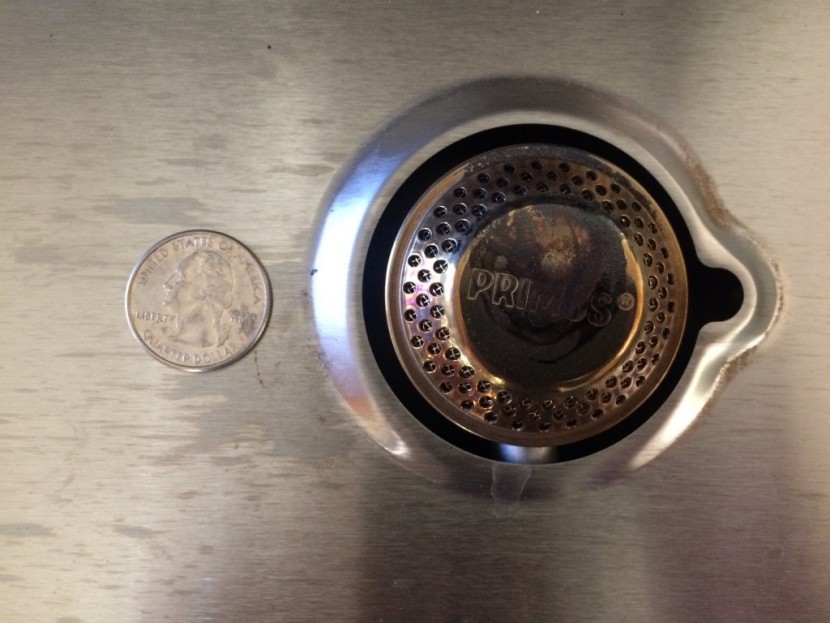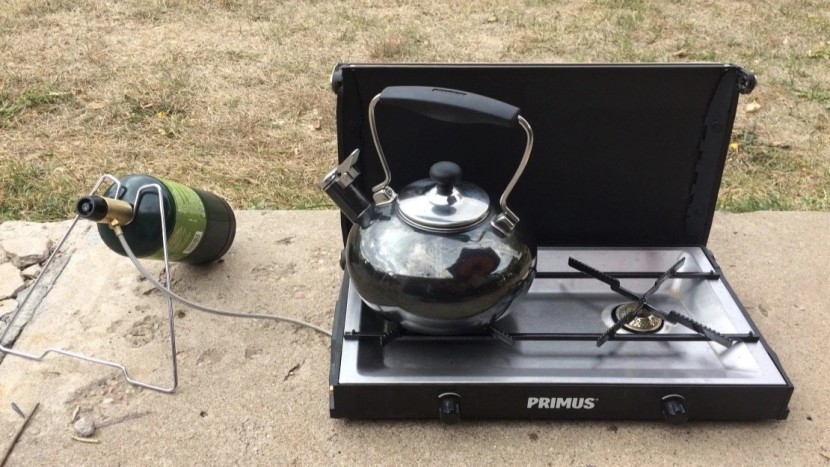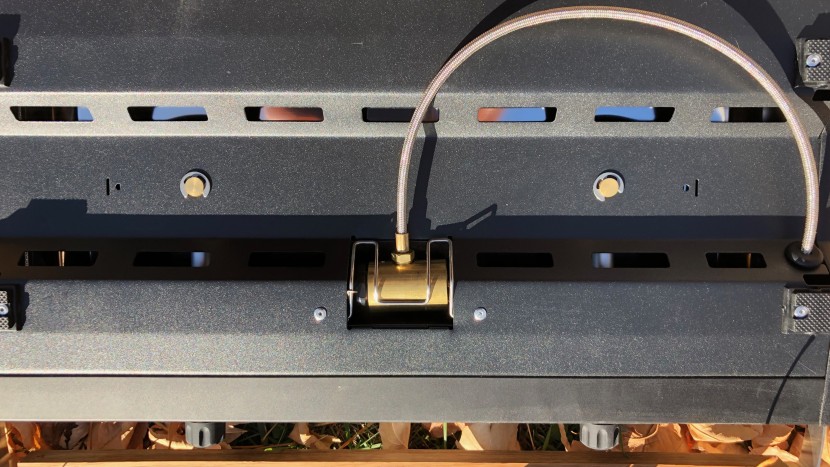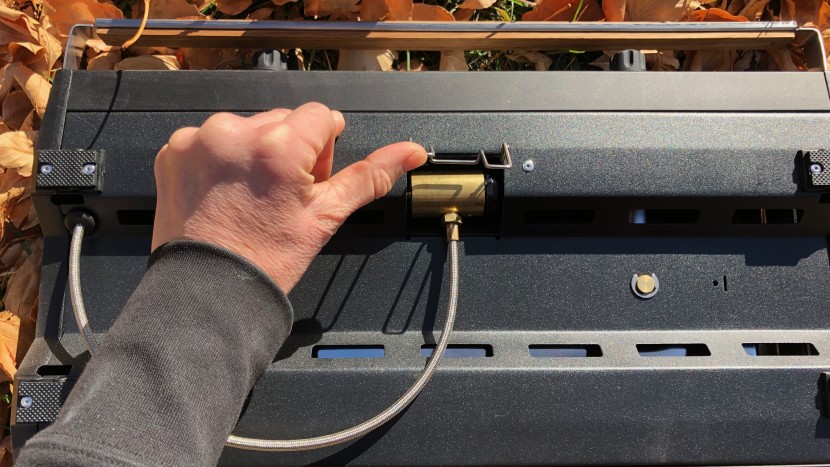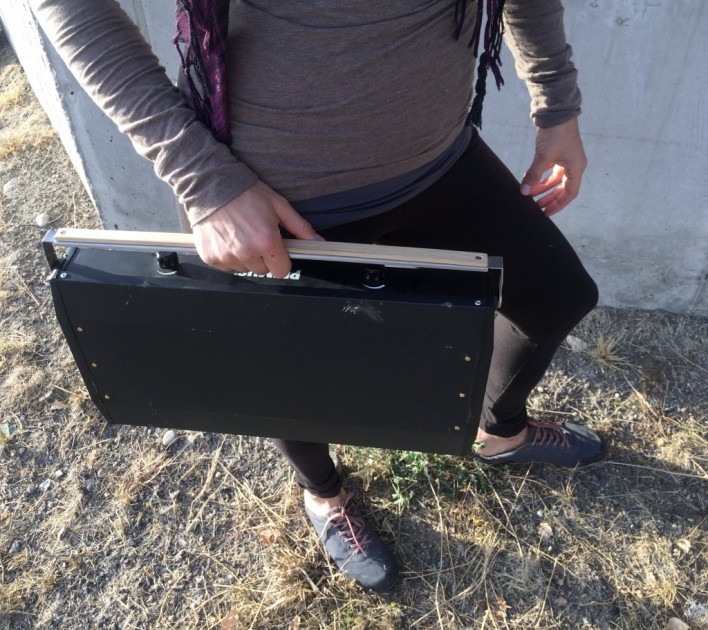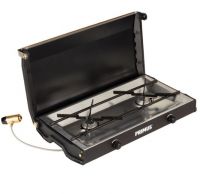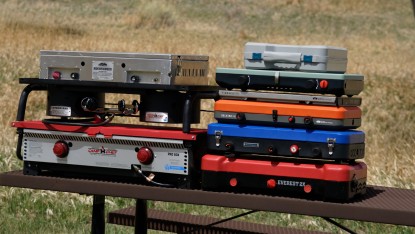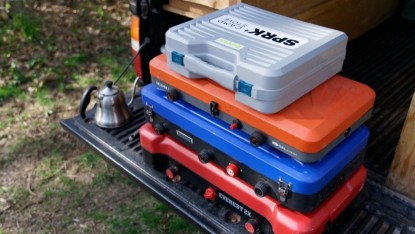
Our Verdict
Our Analysis and Test Results
The Primus Kinjia is well-built and makes it easy to cook your camp meals in style. While it is not the burliest or most powerful stove in our review, if your camp kitchen needs are simple and moderately sized, this is a great, if pricey, stove to consider.
Boil Time
The Kinjia ranked in the lower third for this metric because it was less efficient at boiling water in our wind and wind-less tests. To evaluate the power for each stove, we conduct two boil tests — one in the presence of a constant 2-4 mph “wind” generated by a box fan and another without any wind — then we take the average between the two scores to rank the stoves. It took this stove an average of 6 minutes 22 seconds to boil 1 liter of 58°F water over our two tests.
In the windy test, the Kinjia performed somewhat poorly because it does not have any windscreens. It took this stove 8 minutes 30 seconds to boil water in our wind test. While this ranks low relative to other stoves, it was faster than some models that do have windscreens. This is likely due to how close the burner sits to the cooking grate, and how the burner is somewhat recessed in the stove drip pan. In the wind-less test, it took 4 minutes 15 seconds to boil 1 liter of water, which was faster than half the stoves. It is not a top performer, but it isn't terrible either, the fact that the 2-inch 7,000 BTU burners were able to do this well is a testament to good design and execution.
Fuel Efficiency
The Kinjia proved to be one of the least fuel-efficient stoves in our review. To determine fuel efficiency, we calculate the amount of fuel used in each boil test, and rank stoves based on the average between the two scores. It used 1.15 ounces of fuel or 7.30% of a fuel canister per boil test, proving to be one of the least fuel-efficient stoves in our review. In the windy test, it used 1.6 ounces or 10.16% of the fuel in a canister. In the wind-less test it burned 0.7 ounces or 4% of a fuel canister to boil 1 liter of water. If you love the design of this stove, but want to avoid adding dozens of fuel canisters to the landfill every year (or taking them to your recycling center if you live somewhere that recycles them), we suggest using it with a refillable propane tank and making a windscreen to shield the burners from the wind while you cook.
Simmering Ability
The Kinjia has very user-friendly knobs and relatively low BTUs, thus it simmers with ease. The flame is hard to see when it's turned down low, but the ability to fine-tune and feel confident with accurate flame control is excellent. The small two-inch burners do create a bit of a hot spot in the center of cookware, particularly with thinner pans, but for most meals, this isn't a problem. You will need to keep a lighter handy for this stove, as it does not have an auto-ignition system.
Ease of Use
Of all the models we tested, the Kinjia ranks among the easier stoves to use. There is a minor learning curve with opening this stove, as it has a unique closure system. However, once you get the hang of it, it is fairly simple: the sturdy wooden handle rotates up to unlock and open the lid. Fuel setup is a breeze. The flexible regulator comes pre-attached, and it stows neatly underneath the stove when not in use. The stove comes with a simple stand to elevate the neck of your fuel canister and keep it at the proper angle. The combination of the flexible regulator and stand allows you more flexibility with where you place your fuel bottle.
There are a few noteworthy design features that distinguish this stove from others in our review, some are a bonus while others might be an annoyance. First, the head of the fuel adaptor fits into a small recess and is held in place with a spring-loaded aluminum brace. Previous iterations of this stove had a less durable housing mechanism (an elastic band), so we were impressed to see this upgrade. Second, the stand for the fuel bottle is a separate piece of aluminum. As a rule, our reviewers are not big fans of products that have lots of little parts. The fuel stand could be easily lost or forgotten. Realistically, this isn't the end of the world. While it might mean more trash in the backcountry, most stoves don't come stock with a stand to hold your propane canister at the proper angle, and they still work fine.
The Kinjia performed well in this category because it is among the easiest stoves to clean. In the field, it is easy to lift off the cooking grate to scrub down the almost fully sealed drip tray. For a more thorough cleaning, the drip tray can be fully removed. This is one of the only stoves we tested with a removable drip tray. This means you can make it look sparkly clean and new, no matter how much spaghetti sauce you boil over or how many food bits get dropped below the burner.
Portability
The Kinjia is one of our top picks for packed size with measurements of 18.5 x 11.75 x 3.5 inches. It has a thin and sleek design that's both attractive and functional, and we love the incorporated handle for carrying. A fair question to ask yourself, though, is how important it is to save a little bit of space when you're car camping? Is five inches more space in the back of your car worth the sacrifice of not being able to use two large skillets? Only you can answer that question for yourself. A 10-inch skillet on one burner of this stove leaves the other side feeling quite constricted. Our testers were pretty unanimous in feeling that the extra 3-5 inches of width on many of the other compact models we tested is worth it when you consider how much more power, space, and versatility you get.
Should You Buy the Primus Kinjia?
If you value form just as much as function, then the high price tag of this stove won't deter you. There is no doubt about it, the Kinjia is a sexy stove. It is lightweight, compact, and with the black steel body and wooden handle, it is beautiful to look at. You might want to ask yourself whether these design features are worth extra money to you. Other models in our review are less expensive, but more fuel-efficient and more powerful. Most stoves in our review have built-in windscreens, a wider cooking area, and bigger burners. Value is subjective, so there's no shame if this stove is worth the extra money to you, and we think it might be a wonderful gift for a stylish camper. But for serious foodies and anyone on a budget, it probably doesn't make sense.
What Other Camping Stoves Should You Consider?
We recommend checking out the Camp Chef Mountaineer and JetBoil Genesis Basecamp — both are spendy, but they deliver solid performance across almost every metric, and, depending on your style, they have a certain aesthetic appeal.
| Awards | |
|---|---|
| Price | $250 List Check REI (on sale!) |
Overall Score  |
|
| Star Rating | |
| Bottom Line | Slim and sleek, this stove is small but beautifully built and it simmers like a dream |
| Pros | Compact, flexible fuel hose, easy to clean, excellent simmer |
| Cons | No windscreen, fuel stand is separate and could get lost, attachment for fuel hose is flimsy |
| Rating Categories | Primus Kinjia |
| Boil Time (25%) | |
| Fuel Efficiency (25%) | |
| Simmering Ability (20%) | |
| Ease of Use (15%) | |
| Portability (15%) | |
| Specifications | Primus Kinjia |
| Total BTUs | 20,400 |
| Number of Burners | 2 |
| Cooking Surface Dimensions | 17.25" x 6" |
| Piezo Ignitor | No |
| Measured Weight | 8.1 lbs |
| Average Boil Time (1 liter of water, wind & no wind) | 6 min 22 sec |
| Boil Time (1 liter of water, wind from a box fan) | 8 min 30 sec |
| Boil Time (1 liter of water, no wind) | 4 min 15 sec |
| Cooktop Material | Painted steel |
| Packed Size | 18.5" x 11.75" x 3.5" |
| Burner/Flame Diameter | 2" |
| Distance Between Burners (center to center) | 9" |
| Windscreen | No |
| BTU per Burner | 10,200 |
| Type of Model | Tabletop |
| Fuel Type | Propane |
| Model Number | P-350111 |


